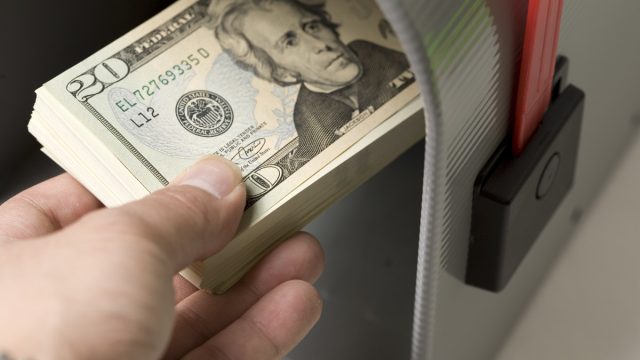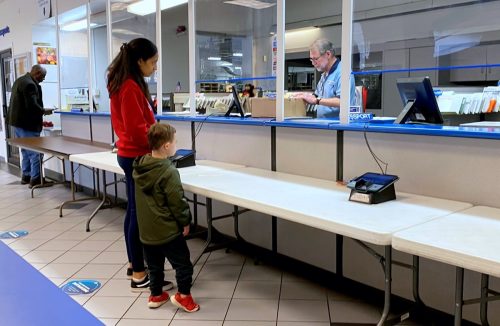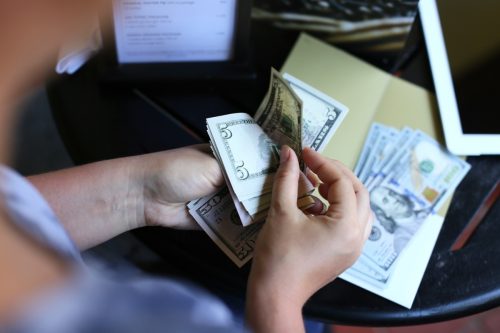USPS Just Issued a New Warning About Mailing Cash

It’s certainly not uncommon for people to send cash through the postal system—maybe you’re mailing a birthday card to a faraway friend, or perhaps you’re lending rent money to a long-distance relative. But no matter the reason, you may want to start thinking twice before postmarking 20-, 50-, or even 100-dollar bills. That’s because the U.S. Postal Service (USPS) is now alerting customers to an enhanced scam that could put them at risk when doing this. Read on to find out more about why the USPS just issued a new warning about mailing cash.
RELATED: USPS Is Making These Changes to Your Mail.
The USPS has warned about mailing cash in the past.

Despite some widely-shared social media posts trying to claim otherwise during the last general U.S. election, you can legally send cash through the USPS. “Regarding sending cash in the mail, no, we do not prohibit it and continue to advise customers about the options they have,” Postal Service spokesperson David Partenheimer told the Associated Press (AP) in 2020.
But that doesn’t mean it’s the Postal Service’s preferred money-mailing method. Instead, the agency advertises its money orders as a “safe alternative to cash,” according to its website. You can send up to $1,000 in a single money order to anywhere in the U.S. via cash, debit card, or traveler’s check. Money orders can be purchased at any post office location and only cost around $2 to $3 depending on how much you’re sending.
“It is advisable to send money via a personal or certified check or money order, as these are traceable and a stop payment can be put on a check if it doesn’t arrive at its destination,” Partenheimer explained to the AP.
RELATED: 5 Surprising Things You Should Never Put in the Mail, USPS Says.
But the agency just issued a new alert about a scam that involves sending cash.

Now, the concept of mailing cash is causing concern once again. In the cover story for its July 27 postal bulletin, the USPS issued a new warning about a con that convinces victims to make risky payments through the postal system. Dubbed the “grandparent scam,” this scheme starts with a scammer gathering personal information about a person—often through their social media—and then contacting that person’s grandparent.
“The scammer fabricates a story that the grandchild has been in an accident or is in some kind of legal or financial trouble and needs money right away,” the agency explained. “Then, they instruct the victim to mail cash to an address so they can take care of the grandchild.”
Unlike a money order, cash is usually untraceable. So once it is sent off, it’s unlikely you’ll get it back from a scammer. “The truth is no one has been in an accident or is in any legal trouble. Everyone is safe, except for your money. It’s gone,” the USPS warned.
RELATED: See a Sticker on Your Mailbox? Don’t Touch It, USPS Says.
This scheme has become more sophisticated recently.

The grandparent scam is not new, however. In fact, the Federal Bureau of Investigations (FBI) has been warning the public about this type of con since at least 2012. But the problem now is that scammers are “adding a new twist that makes this scheme more convincing than ever” through the help of artificial intelligence, the USPS said in its recent postal bulletin.
According to the agency, the Federal Trade Commission (FTC) has warned that con-artists have started using AI voice closing software to mimic the voice of someone’s grandchild. “With only a short video clip pulled from social media, these pro- grams can instantly copy any person’s voice,” the Postal Service explained. “Worse, scammers often couple this tactic with a ‘spoofed’ phone number that shows up on caller ID with the grandchild’s real name.”
RELATED: For more up-to-date information, sign up for our daily newsletter.
The Postal Inspection Service is providing tips to help prevent people from falling victim.

As scammers become more sophisticated, it may be harder and harder to realize when you’re being targeted. To help, the U.S. Postal Inspection Service (USPIS) has provided a “few simple, common-sense steps” to help people avoid being taken advantaged of by the now-enhanced grandparent scam.
“Be suspicious of any phone calls with urgent requests for money, even if it sounds like someone you know,” the USPIS advised in the USPS postal bulletin. “Scammers believe that if they can get you worried about a loved one, you won’t take the time to think things through.”
If you’re being asked to mail cash immediately, the USPIS said you should tell the caller to wait and that you’ll call them back soon. “Before sending any money, verify the details of the story with that person or a trusted family member or friend,” the inspection agency recommended.
Lastly, the USPIS also advised people to think about the time in which they’re being asked for money. “Be especially wary of late-night phone calls,” the agency said. “Scammers like to call victims when they are not fully awake and thinking at their best. Don’t let them catch you napping!”